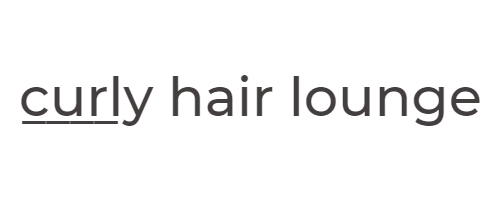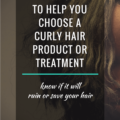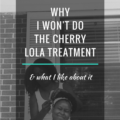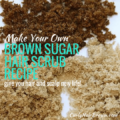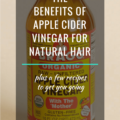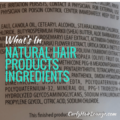Honey has been used for centuries, long before sugar was introduced to us. It is one of those superfoods we should always have in our pantry as you can use it for cooking, baking, desserts, to treat a sore throat, wounds, skin conditions and much more. Additionally, honey has a few characteristics that make it a perfect resource for our natural hair care, but which one should we use?
Why Is Honey Good For Hair?
Although I personally don’t like honey, I use it quite often in my hair regimen to make my DIY treatments. As we all know, water is the greatest moisturiser our hair can ask for, thus why it should be the first ingredient in your chosen moisturiser. Unfortunately, “watering” our hair is not enough to keep it moisturised and to keep dryness at bay, as water is quickly lost into the atmosphere. This is one of the reasons why we seal our hair and why vegetable butters and oils are present in our moisturises. Curiously, honey can also help to retain water in our hair.
This nectar of Gods, or of the bees to be more precise, is a substance that is attracted and holds on to water molecules and retains it inside the hair strand, and as such, acts an humectant helping to trap water in for longer. In hair products, it has emollient, humectant, soothing and conditioning properties when combined with other ingredients. Honey is so good that it’s frequently present in the formulation of shampoos and conditioners and other cosmetic products. You can even take a portion of your conditioner and mix in a bit of honey to cash in some of its amazing effects on hair.
Additionally, with its high nutrient content honey has antibacterial, antifungal and antioxidants properties. A study about the topical application of honey in the management of seborrheic dermatitis and dandruff with diluted crude honey (90% honey diluted with water) showed impressive results. Within one week of treatment itching and scaling disappeared, and within two weeks all skin lesions healed. It was concluded that when done weekly the application is effective in the treatment of dandruff and seborrheic dermatitis. This is great news, but which honey should we use?
Raw Or Processed Honey?
Honey, in its majority, is composed of fructose and glucose, but it also has proteins, amino acids, minerals, enzymes and vitamins. However, the amount of these elements will vary according to the variety of honey you choose, the plant (s) source, and whether it has been heated and filtered, like most commercial honey available.
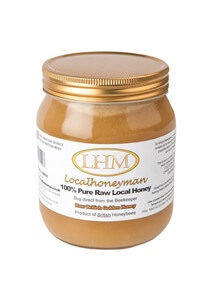 Most of the information you’ll find out there will tell you to choose raw honey as opposed to processed honey, claiming that most of the enzymes, antioxidants and other nutrients are lost when honey is heated and filtered (pollen removed). However, recent research has found that although enzymes do get lost in processed honey, they are not completely eliminated. These (enzymes) are important at the cellular level supporting many biochemical processes in our bodies.
Most of the information you’ll find out there will tell you to choose raw honey as opposed to processed honey, claiming that most of the enzymes, antioxidants and other nutrients are lost when honey is heated and filtered (pollen removed). However, recent research has found that although enzymes do get lost in processed honey, they are not completely eliminated. These (enzymes) are important at the cellular level supporting many biochemical processes in our bodies.
Additionally, many support that processed honey is practically void of bee pollen, which is where most of its medicinal properties come from, as it’s where you’ll find amino acids and antioxidants. These elements help to fight off the negative effects (ageing and disease) that free radicals have on our bodies and hair follicles. Yet, the previous study revealed an increase in mineral and antioxidant content on processed honey when compared to unprocessed honey. Confusing isn’t it? Which one should we buy then?
Consider This
1 – It’s clear that if we want to have the full nutritional benefits of honey we should choose raw honey. This is truer if you’re going to be ingesting it. As with food, the nutritious components of honey will have far more reaching benefits when included in a balanced, diverse and healthy diet, especially when we know the paramount importance that enzymes have in supporting cellular activity. Any benefit they could provide our hair is better focused “before or at the birth of a hair strand” then when applied externally.
2 – Additionally, the medicinal properties of honey are normally analysed through its pollen content where the amino acids and antioxidants are present, and these increase after honey is processed. Therefore, buying raw honey might be better when included in a healthy diet, and processed honey could be used for your external/topical treatments and/or hair masks.
Nevertheless, this is a matter of personal preference, and if you want to buy raw honey for all your doings, that’s OK. If you want the best, buy the best! Just be aware that there is a significant price difference between raw and processed honey.
3- One last tip I want to give you is to buy honey produced at a trusted local beekeeper, or from a trusted national brand. Apparently, some commercial brands have been found to mix honey with caramel. Moreover, although banned in Europe, news on the media have called attention to honey coming from China.
This honey can be contaminated, is processed at very high temperatures and is completely removed of pollen so its origin can not be traced. To make it more consumer appealing it is sold at a much lower price, but this honey appears to be completely useless and possibly even dangerous. This could be the reason why many claim processed honey is stripped of all its well-known benefits.
In conclusion, it might be best to ingest raw honey, use processed honey for your natural or transitioning hair concoctions and avoid honey whose origin cannot be traced or trusted.
